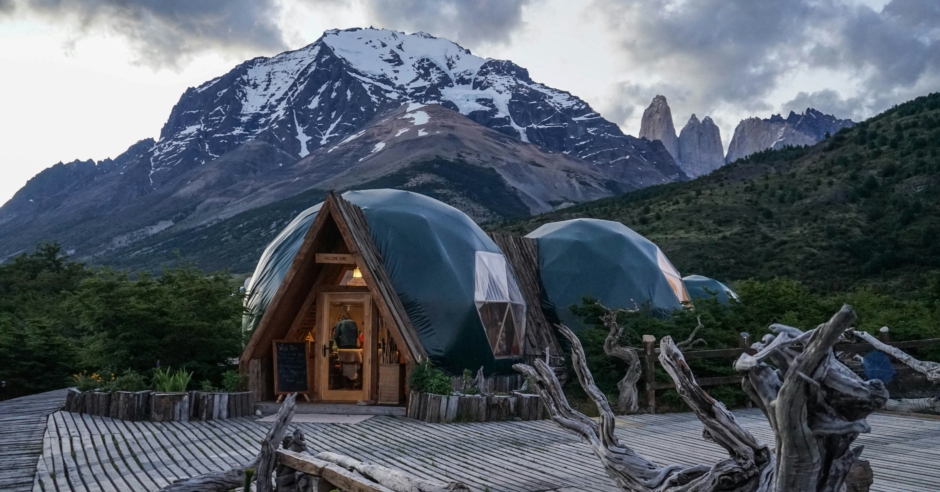Outdoor Hospitality: The Rise of Glamping
In recent years, the concept of “glamping” (a portmanteau of “glamorous” and “camping”) has surged in popularity, captivating the interest of enthusiastic campers looking for a more luxurious outdoor hospitality experience. This consumer demand, of course, leads to a commercial one: real estate investors eyeing the next lucrative venture.
In part due to constraints imposed by the pandemic, this desire to spend more time outdoors underscores a transformative shift in how people seek to spend time outside: by blending the allure of Mother Nature with the comfort of modern amenities. From a consumer’s viewpoint to an investor’s lens, glamping presents intriguing opportunities and considerations.
Note: If you are a General Partner (GP) evaluating an outdoor hospitality, luxury campground, or “glamping” real estate deal, consider managing your fundraise and syndication with Covercy. It’s free!
Why is Glamping Growing in Popularity?
Consumer Perspective
The appeal of glamping lies in its unique ability to combine the serenity and beauty of natural settings with the comforts traditionally associated with hotels or resorts. It caters to those who love the idea of being close to nature but aren’t fans of traditional camping, which often involves foregoing modern conveniences.
Glamping sites can offer luxurious tents, yurts, treehouses, or cabins equipped with real beds, en-suite bathrooms, and sometimes even air conditioning and Wi-Fi. This accessibility to nature, without the hassle of packing camping gear or layering on the bug spray, has broadened the appeal of camping to a more diverse audience, including families with young children, older travelers, and those seeking a unique weekend getaway.
Real Estate Investor Perspective
For real estate investors, glamping represents a growing niche market within the outdoor hospitality and leisure industry that offers potentially high returns on investment. The trend’s popularity is driven by increasing consumer demand for unique travel experiences, especially among millennials and Gen Z, who value experiential travel over traditional forms of vacationing. Moreover, the COVID-19 pandemic has accelerated interest in outdoor and socially distanced travel options, further boosting the glamping market.
Evidence of Outdoor Hospitality Growth
Data showcasing the rise of glamping is compelling. Market research reports have indicated a significant uptick in the glamping market size, with projections suggesting continued growth over the next decade. For instance, the number of glamping sites listed on major booking platforms has dramatically increased year-over-year, and occupancy rates for these sites often surpass those of traditional campgrounds and even some hotels in the same locales. Additionally, social media trends and search engine analytics reveal a growing interest in glamping-related terms, underscoring the concept’s rising popularity among consumers.
Considerations for Real Estate Investors
When contemplating an investment in a glamping campground, investors should consider several key factors:
Location: The ideal outdoor hospitality site for glamping is easily accessible yet offers a genuine sense of seclusion and connection with nature. Proximity to natural attractions, national parks, or scenic landscapes can significantly enhance appeal.
Amenities and Unique Offerings: High-quality, unique accommodations that offer comfort while blending into the natural environment can command premium pricing. Additional amenities such as hot tubs, private decks, fire pits, and curated experiences like guided hikes or wine tastings can further differentiate a glamping site.
Regulatory Environment: Understanding local zoning laws, environmental regulations, and any restrictions on land use is crucial for the development and operation of a glamping site.
Sustainability Practices: Sustainable and eco-friendly practices are often important to outdoor hospitality consumers. Investments in renewable energy sources, water conservation measures, and responsible waste management can not only reduce operational costs but also enhance the site’s marketability.
Marketing and Branding: Effective marketing strategies that leverage social media, targeted advertising, and partnerships with travel influencers can help attract the desired demographic. Building a strong brand around unique experiences and sustainability can foster customer loyalty and generate word-of-mouth referrals.
For a commercial real estate General Partner (GP) accustomed to dealing with more traditional asset classes such as multifamily or manufactured housing, venturing into the outdoor hospitality sector presents a unique set of considerations. While the fundamental principles of real estate investment—such as location, demand, and return on investment—remain relevant, the glamping market introduces specific nuances that can significantly impact the success and sustainability of such investments. Here are key considerations for GPs contemplating outdoor hospitality investments compared to traditional asset classes:
Market and Demand Analysis
- Consumer Trends: Understanding the glamping market requires a deep dive into consumer trends, particularly those related to travel and leisure. GPs need to assess the longevity of the glamping trend and determine whether it aligns with changing consumer preferences for eco-friendly and unique vacation experiences.
- Seasonality: Glamping sites may experience more pronounced seasonal demand fluctuations than multifamily or manufactured housing investments. GPs must evaluate the local climate and market to estimate off-peak periods and develop strategies to mitigate income variability.
Regulatory and Zoning Considerations
- Zoning Laws: Glamping developments may face different zoning laws and land-use restrictions than traditional real estate assets. GPs must navigate these regulations carefully, ensuring that their development plans are compliant and assessing the feasibility of obtaining necessary permits.
- Environmental Impact: Glamping sites often boast their integration with nature, which can raise environmental concerns and regulatory scrutiny. GPs should consider the environmental impact of their developments and incorporate sustainable practices to mitigate risks and appeal to eco-conscious consumers.
Operational Complexity
- Operational Intensity: Unlike multifamily or manufactured housing, which can operate with relatively standardized procedures, outdoor hospitality operations may require a more hands-on approach. GPs must consider the complexity of managing unique accommodations, offering personalized guest experiences, and maintaining the property to a high standard.
- Amenities and Services: Providing high-quality amenities and services is crucial for attracting and retaining guests in the luxury outdoor hospitality sector. This might include everything from high-end bedding to on-site activities, which requires a different operational model than traditional real estate asset classes.
Investment Structure and Returns
- Initial Investment and ROI: The initial investment for developing a glamping site can vary widely, often depending on the level of luxury and amenities offered. GPs should conduct a thorough financial analysis to understand the capital expenditure requirements and the potential return on investment compared to traditional asset classes.
- Revenue Models: Glamping sites offer diverse revenue models, from nightly rental rates to event hosting and ancillary services, like weddings and other events. GPs must explore these revenue streams and how they compare to the income stability and growth potential of multifamily or manufactured housing investments.
Market Differentiation and Branding
- Unique Value Proposition: The success of a glamping investment heavily relies on its ability to offer a unique value proposition. GPs should consider how their outdoor hospitality experience stands out in a growing market and the importance of branding and marketing in attracting the target demographic.
- Customer Experience: The guest experience is paramount in the glamping industry. GPs must prioritize customer service and the overall visitor journey, from booking to post-stay reviews, to ensure repeat business and positive word-of-mouth.
Covercy Can Simplify Your Outdoor Hospitality Syndication
Using an investment management platform like Covercy offers significant advantages for managing outdoor hospitality syndications. With Covercy, you can streamline your most complex operational processes from investor onboarding to payment distribution management. It provides an intuitive, centralized platform that enhances transparency, efficiency, and communication between general partners and investors. With features designed to automate financial transactions, report generation, and regulatory compliance, Covercy enables syndicators to focus more on value-creation activities and less on administrative tasks. This integration of sophisticated technology ensures that managing an outdoor hospitality investment becomes a seamless, more productive experience.
Interested in optimizing your syndication management? Schedule a demo with Covercy today to explore how our platform can transform your investment operations.






